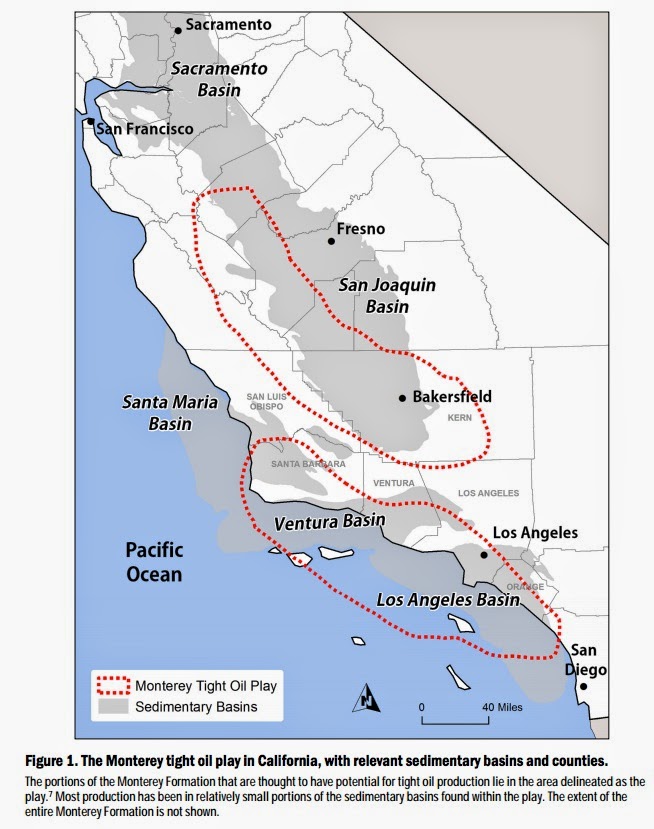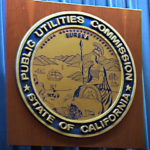It’s clear to me that hydraulic fracking, or acidizing, or any of the similar techniques to break up shale deposits, extract oil and natural gas, continuing the age of oil, all that’s a bad idea and we collectively need to stop the practice and instead, as a society, embrace renewable energy resources. Solar and wind and other technologies are ever so close to the break-even point where they can naturally be the best choice, we don’t have to keep up with fossil fuels. But, there are strong forces pushing to continue burning this stuff, and one tool they’re using is to challenge the legality of a “Fracking Ban”.
I’ve had a discussion about this with a fellow electric vehicle advocate/fan who is also a lawyer. He asked me whether a “Fracking Ban” would be an unconstitutional Taking. It took me awhile to understand the question, but I’ll get to that in a minute.
Browsing the news today, I see a piece in the Santa Barbara Independent![]() talking about how the Board of Supervisors in Santa Barbara County will have to develop a process for considering exemptions to a hydraulic fracking ban on the ballot in that county. The ballot measure would ban all new hydraulic fracturing, acidizing, and cyclic steaming operations in the unincorporated regions of Santa Barbara County, and it would require the county to set up an exemption process.
talking about how the Board of Supervisors in Santa Barbara County will have to develop a process for considering exemptions to a hydraulic fracking ban on the ballot in that county. The ballot measure would ban all new hydraulic fracturing, acidizing, and cyclic steaming operations in the unincorporated regions of Santa Barbara County, and it would require the county to set up an exemption process.
As we see on this map, Santa Barbara is in the middle of the Monterey Shale area which is slated to be the next fracking boom area, if the oil companies get their way. Except, according to the Energy Information Administration, the Monterey Shale is nowhere near the bonanza that’s predicted.
According to the article, County Counsel Mike Ghizzoni wrote a legal analysis saying county supervisors would have to establish a set of rules to deal with potential complaints related to “takings, vested rights, and constitutional violations of state and federal laws”.
There’s my friends issue – “Takings” – plus two other sorts of legal rights which would have to be considered in any application of a fracking ban. In other words, just winning a fracking ban doesn’t mean all fracking will stop within the jurisdiction, because the lawyers will argue on these kinds of legal rights.
So… what is a “Taking” then? I’m not a lawyer and barely know how to read lawyerese, but I did come up with this phrase: “Private property shall not be taken for a public use, without just compensation.” Jason explained to me in an email that “it is an argument that the government, through passing a law, has economically injured the landowner’s otherwise rightful use of his land.”
He went on to explain that it’s similar to “Condemnation” where the government take some land for a public benefit – such as building a highway – and in the process of doing so must compensate the landowner for their land. Which just makes me think of this Jethro Tull song.
Applying this idea to hydraulic fracking – a government which enacts a fracking ban is preventing the land owner from exploiting their land in the way they see fit. Hence, the government is Taking away something of value from the land owner, and their lawyers could use that theory to fight the fracking ban.
It’s a legal theory which could be, and apparently is, be used by the “right wing” to fight what they think of as onerous government regulations like zoning regulations.
That line of thinking says that to be “business friendly” the government has to just get out of the way, and let the businesses and capitalists do whatever they want. But this image I found on Facebook sums up what I think about that.
This concept of unconstitutional Taking![]() was a central piece of arguments in a case in New York which sought to overturn the fracking ban in that state. Unfortunately most of the article is now hidden behind a paywall, but a few months ago when I read the full article towards the end it said the government had a big trump card it can play against this Taking argument. Namely, the government can declare Fracking is a public nuisance so bad that it warrants taking away land use rights.
was a central piece of arguments in a case in New York which sought to overturn the fracking ban in that state. Unfortunately most of the article is now hidden behind a paywall, but a few months ago when I read the full article towards the end it said the government had a big trump card it can play against this Taking argument. Namely, the government can declare Fracking is a public nuisance so bad that it warrants taking away land use rights.
In June, an appeals court ruled on the New York case affirming the right of cities and counties to enact fracking bans![]() . According to the Climate Progress blog, the oil companies argued that oil & mining laws took precedence over zoning ordinances, and that therefore fracking should be allowed to proceed. Rulings by both the lower court, and the appeals court, overturned that claim.
. According to the Climate Progress blog, the oil companies argued that oil & mining laws took precedence over zoning ordinances, and that therefore fracking should be allowed to proceed. Rulings by both the lower court, and the appeals court, overturned that claim.
The Court made it clear they were not ruling on whether hydraulic fracturing is beneficial or harmful, but solely on the policy question of “whether the State Legislature eliminated the home rule capacity of municipalities to pass zoning laws that exclude oil, gas and hydrofracking activities in order to preserve the existing character of their communities.”
You can read the ruling over on Scribd![]() .
.
While in New York the local fracking ban was upheld, a Colorado court just ruled the opposite way regarding a fracking ban in Longmont, CO![]() . According to the Bloomberg Businessweek article, “Judge Dolores Mallard yesterday granted a request by the Colorado Oil & Gas Association to overturn a voter-approved ban on the use of fracking. Mallard rejected Longmont’s argument that the ban is legitimate because the fracking amounts to a purely local matter.”
. According to the Bloomberg Businessweek article, “Judge Dolores Mallard yesterday granted a request by the Colorado Oil & Gas Association to overturn a voter-approved ban on the use of fracking. Mallard rejected Longmont’s argument that the ban is legitimate because the fracking amounts to a purely local matter.”
Anti-fracking activists plan to appeal the ruling, plus organize “the citizens of Colorado to get out and support the Environmental Bill of Rights ballot measure this fall,” according to a statement from Bruce Baizel, director of Earthworks Energy Program, a group that supported the ban.
Getting back to the question at the top – there appear to be real legal grounds under which corporations can challenge fracking bans. Therefore, if we want to really and truly stop fracking some additional tools will be required.
My friend has an interesting idea – require the oil companies to post a significantly huge bond in case there is some negative side effect from a fracking operation. Say, $1 billion per well? These companies contend there’s no risk from fracking – ignoring the epidemic of fracking-induced earthquakes in Oklahoma – so if there’s no risk, then they should be willing to post a bond, right?
I really don’t know much about this, but did my best above to present the issues. Let me know what you think below, especially if I got something wrong in the legal mumbo-jumbo.
- Highway design could decrease death and injury risk, if “we” chose smarter designs - March 28, 2015
- GM really did trademark “range anxiety”, only later to abandon that mark - March 25, 2015
- US Government releases new regulations on hydraulic fracturing, that some call “toothless” - March 20, 2015
- Tesla Motors magic pill to solve range anxiety doesn’t quite instill range confidence - March 19, 2015
- Update on Galena IL oil train – 21 cars involved, which were the supposedly safer CP1232 design - March 7, 2015
- Another oil bomb train – why are they shipping crude oil by train? – Symptoms of fossil fuel addiction - March 6, 2015
- Chevron relinquishes fracking in Romania, as part of broader pull-out from Eastern European fracking operations - February 22, 2015
- Answer anti- electric car articles with truth and pride – truth outshines all distortions - February 19, 2015
- Apple taking big risk on developing a car? Please, Apple, don’t go there! - February 16, 2015
- Toyota, Nissan, Honda working on Japanese fuel cell infrastructure for Japanese government - February 12, 2015














